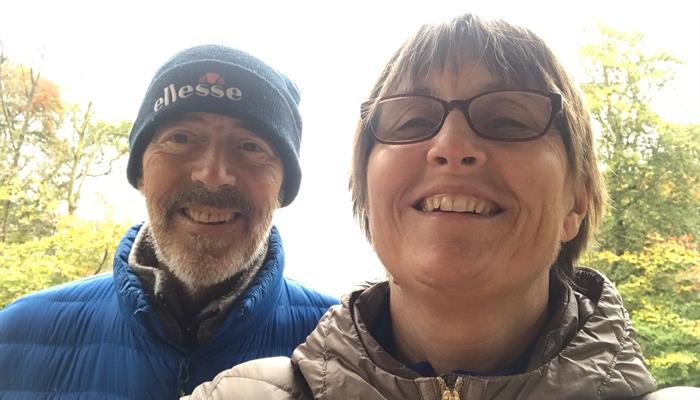Helen, Ged and their family
Gerald ‘Ged’ Shepherd had always been a very active man. But after struggling with shoulder pain and suddenly losing weight, he and his wife Helen, 55, sought help from their GP. After discovering he had cancerous tumours, he was put in touch with Rennie Grove nurses from the charity’s Ridgeway Nursing Team. And as Helen, a former primary school head teacher from Wendover, Bucks, explains, the nurses’ support of the family over the coming months meant Ged could remain at home, being cared for in the comforting environment where he so desperately wanted to remain, surrounded by his family, including children Alex, 20, and Hannah, 18, and springer spaniel Dobby.
“The initial indication that something was wrong with Ged’s health, was that he began to lose weight quickly – but he’d set himself a challenge during 2018 to walk 1,000 miles over the year. By November 2018 he had walked 1,200 miles, so we put the weight loss down to this initially.
“If Ged had a passion for something he’d give it 100%. He was an avid fisherman, then a golfer and his final passion was cycling. The only reason he stopped cycling was the shoulder pain. It was inconvenient, but he could still go out walking. This carried on for quite a while with him trying different pain killers to try to help ease it.
“In January 2019 I sent Ged to our GP for a check-up after noticing how much weight he’d lost. Not long after this he started having terrible night sweats as well, and his leg started hurting.
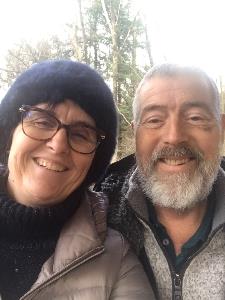
“The next night I found Ged on his knees by my bed crying: ‘Help me.’ He was in so much pain. We went into Stoke Mandeville Hospital and after scans we were told that they had found lesions on his liver and pancreas and tumours in his lung and lower spine/pelvis. This was on 19 May, 2019, and we thought immediately that the cancer was terminal.
“For the next six weeks we weren’t told anything much, until the start of Ged’s chemotherapy treatment. We felt abandoned. We couldn’t say anything to anyone. We didn’t want to tell our children at this point, because our daughter Hannah, now 18, was sitting her GCSE exams. We told my parents and Ged’s brother, and that was it.
“On 3 June, we met with a consultant who confirmed that Ged had Neuroendocrine (NET) tumours – a rare form of cancer, with only 4,000 people diagnosed in the UK each year.
“We were told that around 95% of NET tumours are slow-growing, but Ged’s were fast growing. We were told that the one positive, is that they respond to chemo, and the doctor believed there was a 60% chance of successfully treating them. That was the first time for months we’d heard anything positive. But even if it was successful, Ged might only have 18 months.”
“The Rennie Grove nurses started coming to visit us at the end of June (2019). From the start I noticed that they treated Ged very respectfully, and spoke directly to him rather than sidelining him by talking to me. He trusted the nurses, and would have a laugh and joke with them. From then on they were a lifeline, and a constant reassuring presence. When you are caring for someone, you feel responsible for their life. It’s a really big weight to carry, so it’s nice to be able to call someone and discuss things you’re worried about.”
“I’d call them when I didn’t know what to do and they’d always come out.
“Before Ged became ill I’d never seen someone howling in pain. It’s an awful feeling because in that moment you are utterly helpless. You can’t help the person you love, there is nothing you can do. That’s why Rennie Grove were so fantastic.
“I’d call them when I didn’t know what to do and they’d always come out. The nurses gave me the confidence that I was doing the right thing. I could continue to give Ged pain meds, and when we needed it they could prescribe and administer strong pain relief. Being a carer in that situation can be overwhelming – after all, I’m not medically trained, but the nurses could always give me reassurance.”
On December 30, 2019, Ged received his latest CT scan results. The lesions on his liver had grown, and he and Helen were told he had six months maximum. He decided he didn’t want any more treatment, he wanted quality of life for the remaining time he had left.
Helen says: “Ged wanted to have the best time he could, and set himself challenges. One of these was going to watch England play their Six Nation Games in all the different nations. He wanted to travel to Italy and France, and was determined to achieve that. The France versus England game was on February 2 in Paris and the plan was that Ged would fly there and back in a day, with a friend.
“Not only did he get to the game, but he met Martin Johnson on the way back. He was so happy that he’d been able to go, despite feeling exhausted, and the nurses were genuinely so pleased for him."
“The Rennie Grove nurses were really supportive of his plan, and did everything they could to make sure that Ged was in the best shape he could possibly be, in order to travel. They helped to sort out all the medical paperwork he needed to be able to fly. Two days before he was due to fly out, the Rennie Grove nurse came out to give him morphine as he was in a lot of pain, but they never once tried to talk him out of going.
“Not only did he get to the game, but he met Martin Johnson on the way back. He was so happy that he’d been able to go, despite feeling exhausted, and the nurses were genuinely so pleased for him.
“By this stage I was calling the Rennie Grove Night Team almost daily. From the beginning of February 2020, I rarely left the house and completely relied on the charity for support.
“Ged was struggling to move and couldn’t get out of bed. On one occasion it took me 45 minutes to help him up off the floor. It was so undignified for him, and I had to call Rennie Grove because I couldn’t lift him alone.
“The nurses came round, listened to us, and by the end of that day I had a hospital bed in my lounge, with a wheelchair and a walker. They immediately started looking into respite care for me, so I could get some sleep. From then on we lived downstairs.
“We had the district nurse coming in as well, but it was Rennie Grove staff who fielded calls to the GP and constantly spoke to me about Ged’s pain medication.
“Ged began to decline rapidly. We had to have oxygen at the house because his lungs were failing. Rennie Grove’s nurses came out whenever I needed them, and were a godsend.”
Ged died in the early morning of February 26, 2020. By this time Rennie Grove nurses were coming in twice a day.
Helen says: “Nobody had said his death would be imminent, but it was obvious that Ged was deteriorating rapidly. His breathing became different, and he passed away at 6.23am, with me holding his hand sitting next to him.
“The evening before he had said to me, ‘No more.’ I knew that Ged was telling me that he’d had enough. He’d fought the battle but couldn’t do it any more.
"They knew him as a person, and that made a big difference to both of us."
“The morning he died, Jill came out to see me. She had to complete some paperwork, but she just sat and talked with me. It was lovely to be able to speak with someone who had really known Ged, knew what a card he was.
“When the Rennie Grove nurses had been treating him, his pain medication used to kick in and then he’d start joking with them. They knew him as a person, and that made a big difference to both of us. They treated him normally, had a laugh with him.”
After Ged passed away, Helen had a couple of bereavement counselling phone sessions with Rennie Grove, but then Covid-19 hit and she stopped.
She continues: “Ged knew how much Rennie Grove meant to me, but I also knew how much the nurses meant to him. He felt strongly about the charity because it gave him so much. He’d listen to the nurses, and they provided reassurance and gave him confidence that there was a way forward. He knew that they were always there if he needed them. Ged was always worried that if he went into hospital he wouldn’t come out. The Hospice at Home service gave him the chance to remain in the environment where he felt most comfortable and the reassurance that brought with it.
“Rennie Grove’s personalised care means so much. To Rennie Grove you are not just a patient name, the nurses see you as a person first. Both Ged and I couldn’t have got through without them.
“The nurses weren’t there primarily to look after me, but they went out of their way to support me. They would tell me that I was doing a good job. The book of detailed notes that I’d kept about every stage of Ged’s treatment had been brushed off by others, but Jill told me how useful it was for them and that meant a lot to me. Rennie Grove really looks after carers and those who are left behind when they lose someone.”
Where to next?
-
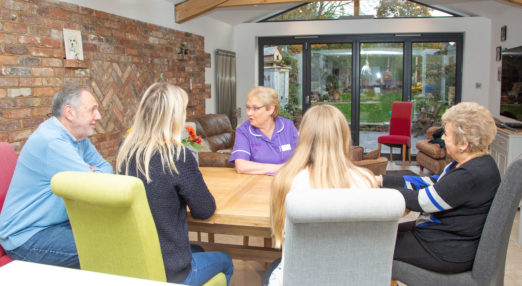
Care stories
Learn more about our care from some of the wonderful patients, carers and families we've had the privilege of supporting.
Read more
-
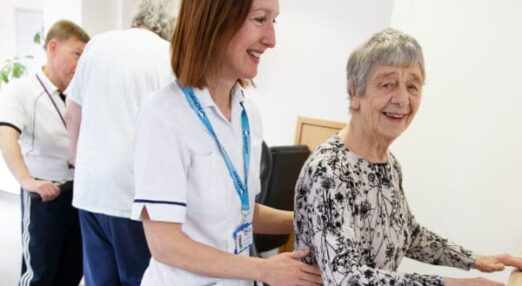
Share your story
Sharing the experience of the support you have received helps brings our work to life, inspiring our supporters and reassuring those in need of care.
Read more
-
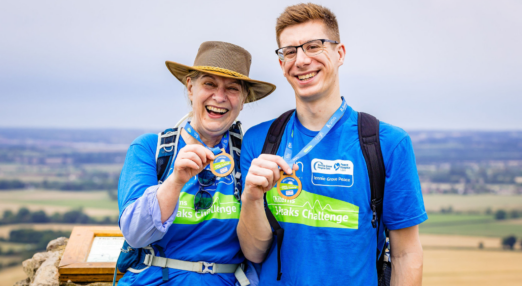
Get involved
Donate, fundraise, volunteer or shop with us to make a difference to local families facing life-limiting illness.
Read more

